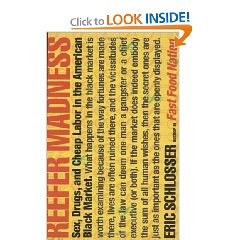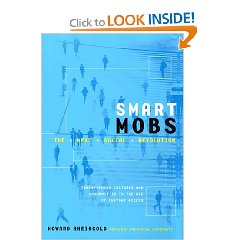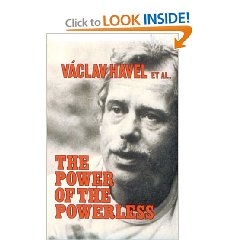Edit of 21 Dec 07 to add links
This book, together with William Geider's The Soul of Capitalism: Opening Paths to a Moral Economy, and Mark Hertsgaard's The Eagle's Shadow: Why America Fascinates and Infuriates the World, in one of three that I believe every American needs to read between now and November 2004.
Across 13 chapters in four parts, the author provides a balanced overview of historical philosophy and practice at both the national level “relations among nations” and the local level (“relations among beings”). His bottom line: that the separation of church and state, and the divorce of social responsibility from both state and corporate actions, have so corrupted the political and economic governance architectures as to make them pathologically dangerous.
His entire book discusses how people can come together, non-violently, to restore both their power over capital and over circumstances, and the social meaning and values that have been abandoned by “objective” corporations and governments.
The book has applicability to Iraq, Afghanistan, and other places where the US is foolishly confusing military power with political power. As he says early on, it is the public *will* that must be gained, the public *consent* to a new order–in the absence of this, which certainly does not exist in either Iraq or Afghanistan, no amount of military power will be effective (to which I would add: and the cumulative effect of the financial and social cost of these military interventions without end will have a reverse political, economic, and social cost on the invader that may make the military action a self-inflicted wound of great proportions).
Across the book, the author examines three prevailing models for global relations: the universal empire model, the balance of power model, and the collective security model. He comes down overwhelmingly on the side of the latter as the only viable approach to current and future global stability and prosperity.
A quote from the middle of the book captures its thesis perfectly: “Violence is a method by which the ruthless few can subdue the passive many. Nonviolence is a means by which the active many can overcome the ruthless few.”
Taking off from the above, the author elaborates on three sub-themes:
First, that cooperative power is much greater, less expensive, and more lasting that coercive power.
Second, that capitalism today is a scourge on humanity, inflicting far greater damage–deaths, disease, poverty, etcetera–that military power, even the “shock and awe” power unleashed against Afghanistan and Iraq without public debate.
Third, and he draws heavily on Hannah Arendt, here a quote that should shame the current US Administration because it is so contradictory to their belief in “noble lies”–lies that Hitler and Goering would have admired. She says, “Power is actualized only where word and deed have not parted company, where words are not empty and deeds not brutal, where words are not used to veil intentions but to disclose realities, and deeds are not used to violate and destroy but to establish relations and create new realities.”
Toward the end of the book the author addresses the dysfunctionality of the current “absolute sovereignty” model and concludes that in an era of globalization, not only must the US respect regional and international sovereignty as an over-lapping authority, but that we must (as Richard Falk recommended in the 1970's) begin to recognize people's or nations as distinct entities with culturally-sovereign rights that over-lap the states within which the people's reside–this would certainly apply to the Kurds, spread across several states, and it should also apply to the Jews and to the Palestinians, among many others.
On the last page, he says that we have a choice between survival and annihilation. We can carry on with unilateral violence, or we the people can take back the power, change direction, and elect a government that believes in cooperative non-violence, the only path to survival that appears to the author, and to this reviewer, as viable.
This is a *very* important book, and it merits careful reading by every adult who wishes to leave their children a world of peace and prosperity. We can do better. What we are doing now is destructive in every sense of the word.
Other recommended books with reviews:
The Wealth of Networks: How Social Production Transforms Markets and Freedom
The Fortune at the Bottom of the Pyramid: Eradicating Poverty Through Profits (Wharton School Publishing Paperbacks)
Breaking the Real Axis of Evil: How to Oust the World's Last Dictators by 2025
Faith-Based Diplomacy: Trumping Realpolitik
Day of Reckoning: How Hubris, Ideology, and Greed Are Tearing America Apart
The Global Class War: How America's Bipartisan Elite Lost Our Future – and What It Will Take to Win It Back
A Foreign Policy of Freedom: Peace, Commerce, and Honest Friendship










